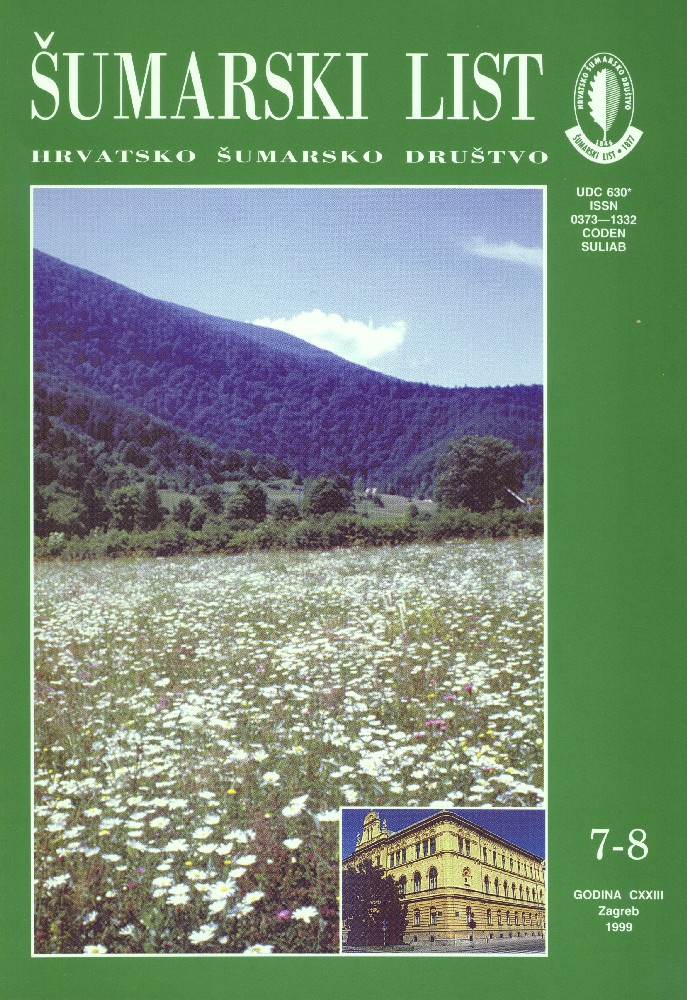
broj: 7-8/1999
pdf (27,1 MB) |
|
||||||||||||||
| IZVORNI ZNANSTVENI ČLANCI | ||
| Vukelić, J., Baričević, D., Perković, Z. | UDK 630* 188 + 907 (001) | |
| Vegetative and Other Characteristics of the Protected Part of "Slatinske podravske šume" pdf HR EN | 287 | |
| Summary: Some twenty kilometres north of Slatina, along the Croatian-Hungarian border on the River Drava, there are 705 ha of very valuable and interesting riparian forests, which were proclaimed "Special purpose forests for scientific research" in 1996. Over a relatively small and scarcely affected area there are examples of site and vegetation succession ranging from river sandbanks with purple and almond willow (Salix purpurea and Salix triandra) to high positions dominated by pedunculate oak (Quercus robur).Fortunately, the Republic of Croatia is among those countries which abound in proper riparian forests. According to the data of the public enterprise "Croatian Forests", there are still about 20,000 ha of riparian forests along the Drava and Danube, half of which are taken by white willows and the rest by poplars and other riparian species. The majority of these forests are found in Baranja, which further increases the value of remote, isolated localities such as the "Slatina Podravina Forests". Vegetative research have shown exceptional natural-scientific value of the 705 ha of riparian forests along the River Drava in the Management Unit "Slatinske Podravske Šume"(the Slatina Podravina Forests). Seven plant comunities with approximately 150 species, found in the alluvial areas along the Drava and the Danube, have been studied. They are shown in the vegetation map M: 1: 25,000, and have the following systematic position: Alnetea glutinosae Br. - Bl. et Tx. 1943 Alnetalia glutinosae Tx. 1937 Alno-Quercion roboris Ht. (1937) 1938 Fraxino-Ulmetum laevis Slav. 1952 Salicetea purpureae Moor 1958 Salicetalia purpureae Moor 1958 Salicion albae Soó 1940 Salicetum triandrae Malcuit 1929 Salicetum purpureae Wendl. - Zel. 1952 Galio-Salicetum albae Rauš 1973 Salici-Populetum nigrae rubetosum caesii Rauš 1976 Populetum nigro-albae Slavnić 1952 Phragmitetea Tx. et Preis. 1942 Phragmitetalia W. Koch. 1926 Phragmition W. Koch. 1926 Scirpo-Phragmitetum W. Koch 1926 Very valuable stands of rare tree species, such as the white and black poplar (Populus alba and Populus nigra) and grey alder (Alnus incana) reach their full developement here due to favourable and only slightly affected hydrological conditions. It is thanks to these conditions that some fine examples of the formation and slow developement of river islands - sandbanks and various degrees of soil and vegetation genesis - are found here. Such cases are very rare in Europe today. Cultures of Euro-American poplars, small white willows and locust-trees grow in area of 170 ha. After the end of rotation period their further growth need not to be supported, but the developement of natural stands, primarily with succession, should be ensured. The studied stands play a very important role in maintaining the biological diversity of this area, preserving the gene fund of rare but important tree species (white and black poplar and grey alder), and providing the medium of scientific research and education of riparian forest management. Therefore, the protection of this part of "Slatina Podravina Forests", provided by the Ministry of Agriculture and Forestry and by forestry experts in the public enterprise "Croatian Forests", is fully justified. This is yet another confirmation that the Croatian forestry science has adopted a proper view of the importance of protection and future of valuable regions in the Republic of Croatia. Our research is a positive contribution to evaluating and presenting natural facilities. Similar steps and studies should be conducted to form a basis for proclaiming various protected categories by the State Administration for Nature and Environment Conservation. | ||
| Topić, V. | UDK 630* 232 + 232.1 + 233 (001) | |
| Surface Excavation in the area of Kaštela and the Possibilities of their amelioration pdf HR EN | 301 | |
| PRETHODNO PRIOPĆENJE | ||
| Trinajstić, I., Franjić, J. | UDK 630* 188 | |
| Beech forests with ciliated reed grass (carici pilosae-fagetum Oberdorfer 1957) in the vegetation of Croatia* pdf HR EN | 311 | |
| PREGLEDNI ČLANCI | ||
| Harapin, M. | UDK 576.89 | |
| Ticks and some anthropozoonoses pdf HR EN | 323 | |
| Kružić, T. | UDK 630* 679 | |
| development of computerized information system in Croatian forestry pdf HR EN | 329 | |


